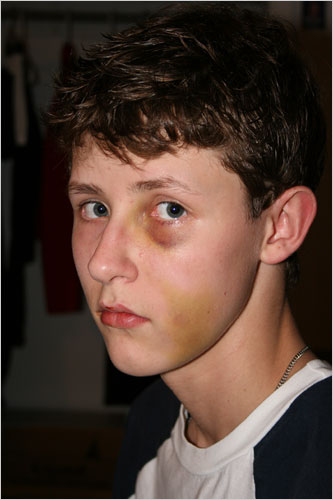involving in bullying = unhappy life

Description: being bullied = being vulnerable
Image copyright: http://www.dailymail.co.uk/pages/live/articles/news/news.html?in_article_id=490250&in_page_id=1770
Bullying is a subject that affect students in school, especially in high school. In fact, it has affected teen’s behaviour in different ways than they had before they were involved in bullying. For instance, the behaviour involves self-esteem that is lowered, unhappiness in their lives and people judging them negatively such as family making fun of their children. Also, students who are victimized by the bullies also have the possibility of being hurt emotionally, psychologically and physically (Jankauskiene, 2008).
3 types of bullying are defined by scientists such as verbal, relational and physical. Both bullies and victims have similar factors such as low self-esteems, their academic performance are lower than usual. The background may also involve the past life of their parents. For instance, they may be aggressive, their academic performance was low, and they may not be sociable among other people. An example that could clear my point about aggressiveness in family may be the shouting and always get angry (Jankauskiene, 2008).
It is important to know that boys are more involved in bullying as well as being victimized of bullies. For instance, students in high school of the city of Lithuania reported that 67% of boys are involved in bullying and 49.7% of girls are involved in bullying (Jankauskiene, R., 2008).
Also, the average students of 6th grade and 5th grade are the ones that are being bullied and bullies the most than any other grades. Say 64.5% of 6th graders are involved in bullying and 69.5% of 8th graders are involved in bullying as well. Whereas students of other grades have lower percentage such as 46% or lower. (Jankauskiene, 2008)
Moreover, students who are victims of bullying tend to take medication in order to ease their pains. For example, in regards to psychological problems such as sleeping disorders, stress, headaches and stomach aches incite them to take medication. As a result, bullying is ‘’terribly deteriorating’’ for children’s lives, according to Rauscher in the Bullied teens often take pain-killers to cope (Rauscher, M. 2007).
Also, some others may have worse cases where they are likely to get revenge on people to get rid of their frustrations. Let us go back to the ex-classmate at Virginia Polytechnic Institute who has murdered around 32 people last year. The main cause of the shooting was that he was unhappy with his life. In fact, he was bullied by many students because of his accents when he reads to class. This report explains how victims of bullying can have psychological problems that can lead to harming people. (NBC)
Why students bully? Well, for one thing, it could be a matter of size. For example, they bully because they are physically superior to the victims. When they pick on them, they feel more powerful. So from this entire situation, children and teens who suffer from being teased need help. It occurs often that bullying happens when staffs in schools aren’t supervising. And so, bullies tend to bug innocent students just because they have the opportunity to make it so. They want to get attention. Also, teachers cannot always walk around in hallways or outside to supervise students, because they have other things to do (Herald, C. 2003). There is a clip in the link on the right page to prove my point: My Bodyguard a**kicking Bully clip http://youtube.com/watch?v=sKMjpN2iCmc
In this clip, the teen that is getting bullied does not do or say anything when 2 people come up to him. This may be a sign that his self-esteem is lower and is not confident enough to fight back or to say whatever is on his mind.
In Canada, school kids are being bullied every month. Say 25 % are attacked and 20 % are the bully, there is a solution that prevents children and teens from being involved in bullying. Since, 2004 the Anti-Bullying law in Quebec has been the first workplace established in North America. Their own definition of victims being bullied is ‘’psychological harassment’’. It is important to know that not only students can be involved in bullying, employees also. The labour Standards Commission is there for complaints. As a consequence, the bully may pay moral damages for hurting the employee. (Soares, A. 2006)
There are programs that can be offered for children ans teenagers who are victimized by bullies. One of them is organised by, Dr. Joel Haber. He organised a program called The Bully Coach: A respect U Program Camp, in the U.S. He established it to make kids feel better about them. Therefore, he tries to make kids ‘’bully-proofed’’ and to increase their self-esteem. Also, this camp includes many counsellors and staff that are willing to help kids to make their life better. Being involved in bullying affects many kids and teens, whether is physically, psychologically or emotionally (respectu.com).
There are solutions they could help victims to cope with their fears from being involved in bullying. For instance, as a tactic, a teen should stay peaceful. Why? Because, bullies love when they get scared when they approach you. Also, teens should avoid getting into fights, because they might worsen the situation. Violence does not solve anything. Those kinds of anti-bullying tactics can help children and teens from getting involved in bullying (safecanada.ca).
Barry, D. (2008) A Boy the Bullies Love to Beat Up, Repeatedly, The New York Times, 1-2.
Herald, C., (2003), Bullying kids get early start, Canada.com News
Jankauskiene, R. (2008) Association Between School Bullying and Psychological Factors, Social Behaviour and Personality, 145-162.
Popkin, J., Handelsman,S., Williams, P. (2007) High School Classmates say Gunman was bullied, NBC news
Rauscher, M.(2007) Bullied Teens often Take Pains-killers to Cope, Reuters UK.
Safecanada.ca, Goverment of Canada
Soares, A. (2006) The Anti-Bullying Law: The Quebec Experience, University of Quebec, 1-23.
http://www.respectu.com/
